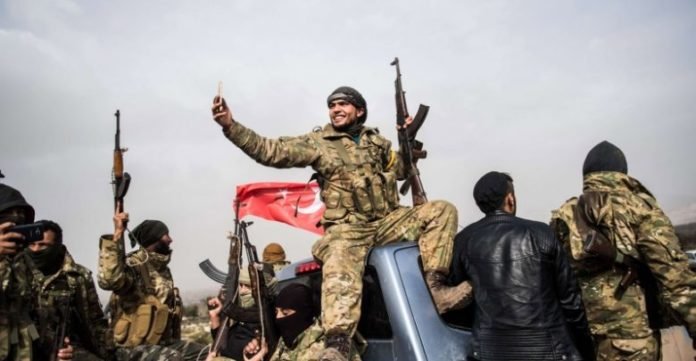Some 4 percent of the Turkish-backed Syrian National Army’s (SNA) ranks comprised child soldiers in the years prior to early 2020, according to a report released on Wednesday by the Foundation for Political, Economic and Social Research (SETA), a pro-government think tank, the Ahval news website reported.
According to the report, since deleted from SETA’s website and social media accounts, 7.85 percent of 1,490 fighters declared their age to be between 18 and 20, and 3.66 percent of 1,474 fighters said they had been fighting for two years or less. The survey was conducted in December of last year.
A Turkish pro-gov think-tank @setavakfi deleted from their website & Twitter a study about the Syrian Turkish-backed factions (SNA), possibly because it accidentally revealed that the factions are recruiting children. My back up of the study: https://t.co/RxA9h23Nkz https://t.co/28nL8n0ulE
— Elizabeth Tsurkov (@Elizrael) November 19, 2020
Overall, 93.22 percent of fighters said they had been in the SNA for more than three years, and 63.19 percent have been in the SNA for more than seven years.
The responses suggest that some 4 percent of participants came of age after they joined the SNA, which was established in December 2017 as a collection of Turkish-backed Syrian rebel groups, and it could be the case that underage fighters had been active within rebel groups before they came together as the SNA.
There are between 70,000 and 90,000 fighters in the SNA in total, with 30,000 to 40,000 in the first three legions included in the survey, according to the report.
Amid accusations by Russia, Armenia and France that Turkey recruited mercenaries from the SNA’s ranks to fight overseas, the survey found 0.58 percent of 1,544 fighters saying their primary motivation was money, and 2.21 percent of 1,539 fighters giving money as their secondary motivation.
When asked about their income, 64.63 percent said their family had a monthly income of 500 lira ($66) or less.
Centre for Global Policy fellow Elizabeth Tsurkov pointed to the 24.90 percent of respondents who said they had been fighting for “more than nine years,” putting their initiation date to before protests in Syria devolved into a civil war.
In a statement in September, UN High Commissioner for Human Rights Michelle Bachelet portrayed the human rights situation in parts of northern Syria under the control of Turkish forces and Turkish-affiliated armed groups as “grim, with violence and criminality rife.”
The UN Human Rights Office noted “an alarming pattern in recent months of grave violations in these areas, including in Afrin, Ras al-Ain, and Tel Abyad, where increased killings, kidnappings, unlawful transfers of people, seizures of land and properties and forcible evictions have been documented.”
Bachelet said the victims include people perceived to be allied with opposing parties or as being critical of the Turkish-affiliated armed groups’ actions. They also include those considered to be wealthy enough to pay ransoms. The statement noted the increased infighting among the various Turkish-affiliated armed groups over power-sharing, with little or no regard for the safety of the local population, as well.
“People living in these areas whose rights have been violated are entitled to protection and a remedy. In this regard, I urge Turkey to immediately launch an impartial, transparent and independent investigation into the incidents we have verified, account for the fate of those detained and abducted by the affiliated armed groups and hold accountable those responsible for what may, in some instances, amount to crimes under international law, including war crimes,” the high commissioner said.
According to data from the UN Human Rights Office, at least 116 civilians died as a result of improvised explosive devices (IEDS) used by unidentified perpetrators and explosive remnants of war (ERW) from January 1 to September 14, 2020. Of the deceased, 22 were children and 15 were women. Some 450 civilians were injured.
Turkish-affiliated armed groups have also seized and looted people’s properties without any military necessity and occupied many of them with their own families, according to the high commissioner.
Bachelet also called on Turkish authorities “to respect international law and to ensure that violations committed by armed groups under Turkey’s effective control cease.”
“This is all the more vital given that we have received disturbing reports that some detainees and abductees have allegedly been transferred to Turkey following their detention in Syria by affiliated armed groups,” she added.
















